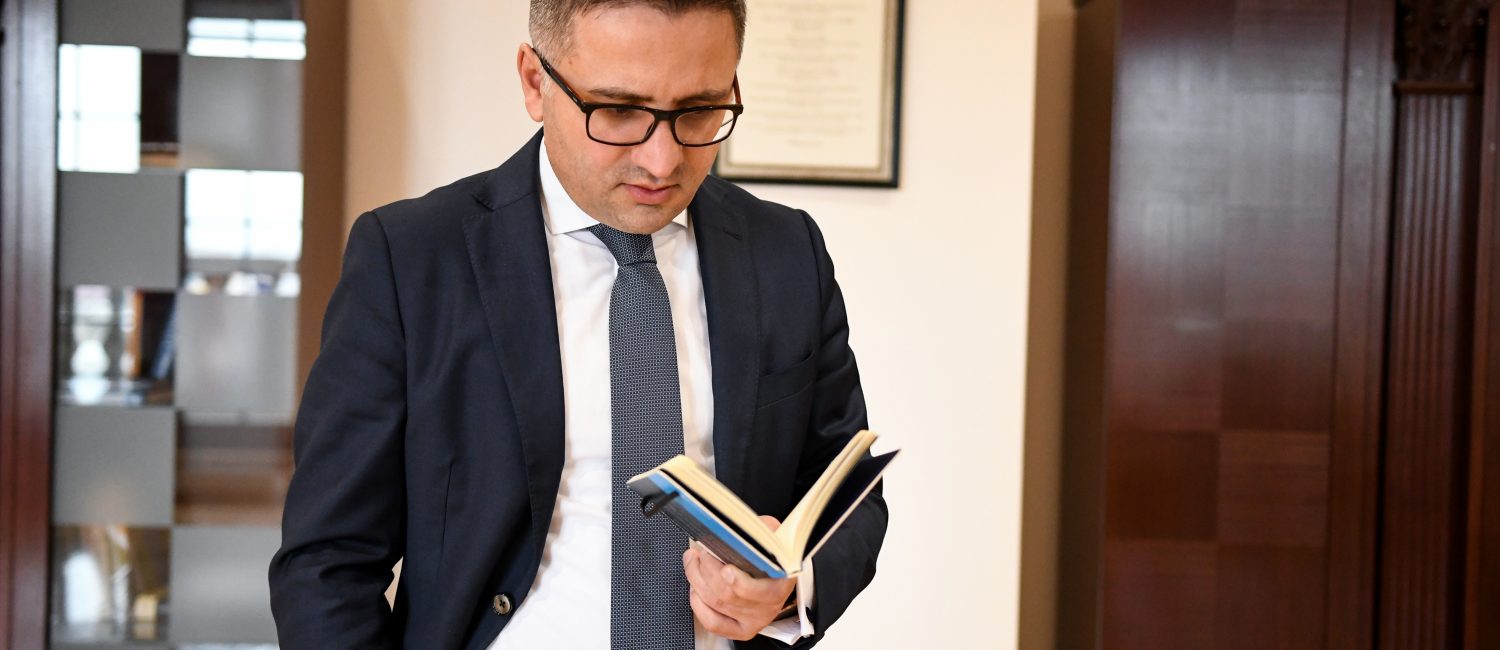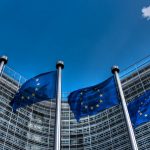5th February 2023m Skopje – “A day will come when the only fields of battle will be markets opening up to trade and minds opening up to ideas” – Victor Hugo
Idea of united Europe dates long back in history, however one of the first proposals for a peaceful merging through cooperation and equality of the members was made by the renowned French writer Victor Hugo back in 1851. As per his vision: “… the United States of America and the United States of Europe, stretching out their hands across the sea, exchanging their products, their arts, their works of genius …”. Catastrophic consequences from WWI and WWII and the need to rebuild Europe and its economy led to uniting of part of the European economies in a new community. The European Steel and Coal Community was established by having Germany, France, Italy and Benelux sign the Treaty of Paris (1951), which became operational in 1952. From that moment on, the economy and the economic interests, as well as the joint drive for peace, safety and human rights are guidance for the countries in Europe to unite. Under the Treaty of Rome (1957, entering into force in 1958), European Economic Community, or the first full customs union, also known as common market, was established. Over time, this community evolved into European Union, comprising 28 Member States (27 at present), a heterogeneous blend of cultures, languages and history, all united by common goals for better living conditions for the citizens.
Rules and Standards
According to Aesop, union gives strength and yields better results – a story of a father who showed his sons that a single stick is easily broken, but not the bundle of it, symbolizes the essence of the Union. Against such fabled background, I will underline that requirements are set for the countries to meet so as to become part of this European beautiful, multicultural, pacifistic and development-oriented story. Аcquis communautaire or “the EU as it is” is the body of rights and obligations which bind all Member States together with the European Union. Through the acquis, the European Union encourages change and alignment of the legislation, the policies and the institutions of the candidate country so as to attain the values and the norms of the Union. To become an EU Member State, the candidate country is to meet political criteria from the point of view of stability of institutions guaranteeing democracy, the rule of law, human rights and the respect for and protection of minorities, economic criteria in terms of functioning market economy and the capacity to cope with competition and market forces within the EU. EU candidate countries are expected to possess the ability to take on the obligations of membership, including adherence to the aims of political, economic and monetary union, requiring sufficient administrative capacity of the candidate country to transpose the European into the national legislation for the purpose of its enforcement. All EU accession criteria, political, economic and legal, also known as Copenhagen Criteria, are strengthened with the Madrid Criteria, under which the candidate countries adjust to the administrative structures, i.e. harmonization of the national legislation with the European one is not sufficient by itself, it is rather necessary for the candidate countries to build administrative capacities sufficient to implement it.
Integration Process
I will elaborate the procedures in short, so as to provide context for what follows. Process of harmonization is carried out through the screening process, when EC presents the legislative the country is to transpose in the national legislation for each chapter separately, while the candidate country presents its most recent achievements. In line with the findings following the preparation of the Screening Report by the European Commission, which Report includes all drawbacks with respect to the legislation and the administrative capacity, which are to be overcome during the negotiations, chapters are opened under a decision of the EU Council. During the negotiations, the country is given deadlines to adhere to so as to fully harmonize its legislation with the acquis. Following the closing of the negotiations, date for fully-fledged EU membership is determined. Next step, or the third phase, involves the readiness of the country to become member of the European Monetary Union, i.e. to adopt the euro as a legal tender.
As a professor of economics, by vocation, I can be rather extensive with the introductions, however, the timing is right and the topics elaborated in this column are justified, considering that our administration, our institutions’ representatives, were actively working on the screening process in Brussels in the past months. Apart from the political developments, the screening process is a very important part of the integration itself, since at the moment EU is ascertaining our dedication and readiness to become its member and commit to the duties. Apart from the political momentum, the challenges are considerable and a serous work is pending ahead of us. To underline, the journey itself is as essential as the destination, with each step forward being our gain.
I would emphasize that even in times of long-lasting crisis, i.e. overlapping crises with simultaneous perilous economic effects, now, more than ever, it is necessary for the countries to support each other and overcome the problems with joint efforts.
EU – The Whole is Greater than the Sum of its Parts
I would touch upon the practical reasons and benefits from EU membership, from the point of view of the key driver of this union – the economy. There are many macroeconomic indicators pointing to the positive effect of the EU in pre- and post-accession period. Even in the pre-accession process itself, positive trends are observed in the countries (by isolating the effects from the economic cycle phases). EU membership, above all, involves accessing a market of more than half a billion consumers. EU’s economic power also reflects on both the trade and the foreign direct investments, accounting for 16% of the total global trade. North Macedonia’s membership in the EU will provide for access to a 25 times larger market, five times higher nominal GDP per capita (whereby real GDP per capita of our economy is around 40% of EU’s GDP, according to Eurostat), as well as bring about significantly lower unemployment rate. According to a 2014 study (Coricelli, Moretti, Campos), the results, obtained by applying series of data from the 1980s and 2004 enlargement data, show increase of the existing GDP per capita by 12%. There are number of studies dedicated to assessing the economic benefits from the European Union, with one of them showing that GDP per capita of the EU would be one fifth lower if no integration had taken place since 1950 not take place (Badinger 2005). Other studies show high effects of the membership on the growth, also warning of the heterogeneity of the economies as a factor. Moreover, studies about the European Commission were made in 2019, referring to the benefits of the EU single market which, unlike any other free trade agreement, is open to all sectors and individuals. According to the studies, it is assessed that EU gross domestic product would be 9% lower if no full integration of the single market had taken place which, in average, is around EUR 840 less annual income per capita. Observed by individual Member State, this number varies, ranging from EUR 193 per capita in Bulgaria to EUR 2,834 in Luxembourg. Accordingly, viewed from this perspective, each Member State is better of in the EU rather than being out of it, pointing out to the fact that EU creates a new value, i.e. a value added with positive externalities. As Aristotle would say “The Whole is Greater than the Sum of its Parts”.
Making a comparative analysis between the Member States which most recently joined the EU and the Western Balkan countries, according to World Bank data, the new Member States register higher growth, approaching the EU standard of living with a much faster pace than the Western Balkan countries. Higher labour productivity is also observed in the new Member States. Business climate in these countries is more favourable in average, as per the Doing Business Report, coupled with faster progress in structural reforms for private sector development. New Member State also show a greater progress in institutional democracy and good governance – freedom of expression, political stability, regulatory quality, government effectiveness, as well as rule of law and control of corruption, compared with the Worldwide Governance Indicators.
EU with Value Added and Positive Externalities
EU membership is also featured by other economic and non-economic advantages, which may be more difficult to quantify, but still affect the economic performance of the country. This is illustrated with the joint addressing of issues such as climate change and soil and water pollution, thus increasing the efficiency and effectiveness of the joint actions compared to the steps taken by each of the nations separately. Another alike example is the common fight against corruption, smuggling and prevention of money laundering, also including the cross-border exchange of information aimed at protecting the rights of citizens, from the aspect of their safety as EU citizens, but also their security as consumers. The least but not least is the assurance by the EU in terms of the value added being present in all segments of the economy. I would like to hereby also stress the significance of NATO membership, in particular amid global safety challenges stemming from the hybrid attacks and the geostrategic turmoil caused by the Russia’s military aggression against Ukraine last year, which, in addition to the human and economic hazards, has brought about many other uncertainties.
EU Funds and Public Finance
As a Minister of Finance, I would like to touch upon the public financial management system. I can proudly say that we made significant steps as regards the public financial management reforms, being one of the most extensive reforms in the recent decades, which are expected to significantly improve the process as a whole. I am hereby alluding to the Organic Budget Law, thus providing for more strategic and integrated way of acting in line with the stringent EU Criteria, also including the public debt management limits, i.e. the Maastricht Criteria, setting the budget deficit and public debt limits. In addition, in view of the Growth Acceleration Plan, the access to European Funds, under which earmarked funds are provided in support of attaining the development goals, is crucial in achieving our primary goal, i.e. ensuring higher and sustainable economic growth rates while preserving sound macroeconomic fundamentals.
When describing the European Funds in more detail – in the period 2021-2027, the EU Budget is estimated at around EUR 2,000 billion as funds aimed at supporting the following areas: Single Market, Innovation and Digital, Cohesion, Resilience and Values; Natural Resources and Environment; Migration and Border Area Management; Neighborhood and the World and the European Public Administration. With each new progress made towards the EU accession, the country is provided with access to the new Funds for financing certain goals, such as the Instrument for Pre-Accession Assistance (IPA) – intended for the candidate countries and countries aspiring to join the EU, whereby we, as a candidate country, have access to all five IPA components. This is coupled by the Instrument for Pre-Accession Assistance for Rural Development (IPARD), EU financial assistance for sustainable agriculture and rural development, with the focus being placed on harmonization with the EU common agricultural policies, attaining competitive agriculture, as well as developing sustainable rural areas. EU accession will provide the country with access to many other Funds for structural support in encouragement of the development goals.
In light of public finance reforms and their significance in building a sound economic system, which is to deliver higher economic growth rates, which will be functioning as a apart of the EU, I would also like to use this opportunity to highlight the importance of human capital in this process. MoF’s staff is extremely important in the public finance reform process, hence the investments, as well as the appropriate valuation and retention of such personnel is crucial. I will stress once again that we all undertake all necessary measures to prevent the outflow of the staff thereof. Human capital is equally important in other areas as well, depending on the competences, the complexity of the obligations and the pressures on the market.
“Economic Model to Bring Europe Home”
While acting as Deputy Prime Minister in charge of European Affairs, I wrote ten and so columns, elaborating on, for the sake of accountability as well, both the integration process and our desire, as a nation, to join the EU, by giving an overview of the EU integration during the period from 2014 Progress Report until 2015 when the European Commission gave its seventh recommendation to open accession negotiations. As I previously stressed, this is not a simple and easy thing to do but the attained results rather make this process worthwhile, with the membership being the ultimate reward thereof, thus paving the way for a better life for all our citizens, as well as providing for self-improvement and creation of a prosperous European society and economy.
Back in 2015, I wrote that “we need an economic model, mostly based upon job creation (in the private sector), by boosting the competitiveness, and improving both the infrastructure and the business climate.” Transparent and accountable public financial management is required, all to the end of supporting and encouraging investments, as well as advocating for social and territorial cohesion, while also promoting balanced regional development. Foreign investments will certainly provide for promoting the exports and boosting the economic productivity. However, state-of-the art technology is undeniably required therefore. New mindset is what we need as well. Economic development model, based upon competitive and integrated economy, with equal opportunities for all, would prevent us from taking baby steps, thus being able to join the so-called United Europe as soon as possible. “Let me paraphrase – without pretending to have a scientific model at hand, but rather as a sublimation based on high-quality scientific papers and plenty of reports and analyzes by international institutions, as well as arising from the domestic expert debate – an economic model based upon investments, innovations, human capital, infrastructure and new technologies, which will make our economy more competitive (fit for the European market and beyond), will provide for creating new jobs, ensuring faster growth, i.e. more inclusive and sustainable growth in the medium and long term, green transition and improved quality life for the citizens. Economic model that will bring Europe home.
We are Europe
EU membership implies reinforced geostrategic position of our country, and equal participation in the decision-making process as regards crucial issues. It provides for increased safety and stability of the country, thus creating stronger basis for economic growth and development, which, in turn, contributes to higher credit rating of the country, and scaled-up domestic and foreign investments. Fresh investments will entail new jobs, accompanied by advanced knowledge, new technology and boosted competitiveness of the domestic economy. Boosted competitiveness implies increased both exports and trade, as well as faster economic growth. Structural reforms, as well as reforms regarding democracy and rule of law, will be implemented with faster dynamics. Living standard and the economic outlook of the country are improving. Holding onto the vision of a European future, which we already advance thereto, is worthwhile give the numerous benefits arising therefrom.
Our goal is to create a bright future for the youth in our country. Brain drain and staff outflow is the biggest loss for the society and the economy of a country. Hence, the living conditions should be continuously improved, thus providing for the living standard to be as high as the one of young people living in EU countries.
This is exactly why the accession process is so important, i.e. by implementing the necessary reforms, we will be able to bring Europe home. This process provides for improving our system, thus ensuring a better tomorrow for all of us, and upon the EU membership, the effect therefrom will only reinforce the already attained results.
Each obstacle should not be a discouragement but rather a motivation for developing our society and generating better results. Even Rome was not built in a day, and as one of the founding fathers of the European Union, Robert Schumann, said, “Europe will not be made all at once, or according to a single plan. It will be built through concrete achievements, which first create a de facto solidarity”.
















